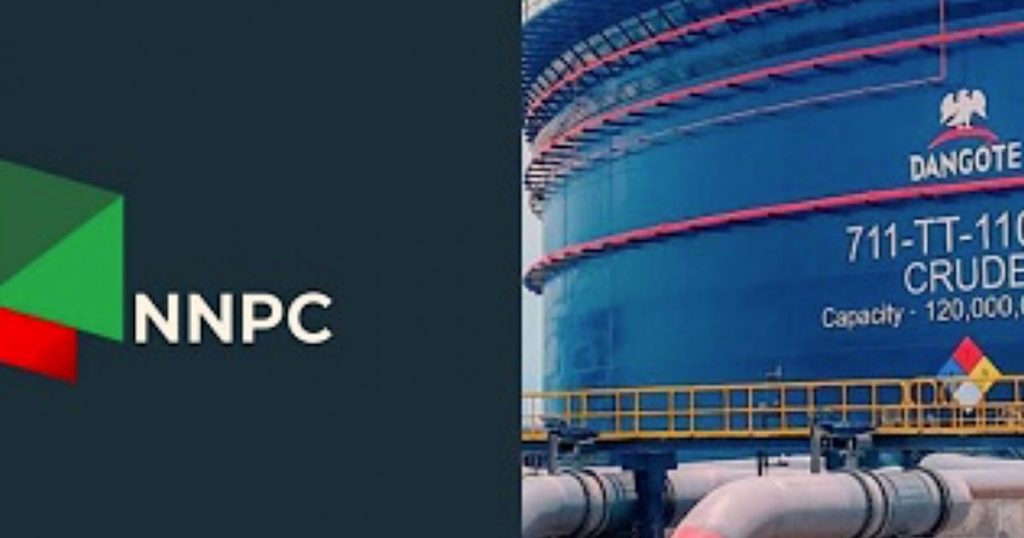The Nigerian National Petroleum Company Limited (NNPCL) reported substantial revenue from crude oil sales during the first quarter of 2025, totaling N336.37 billion. A significant portion of these sales, over 32%, or N107.44 billion, stemmed from crude oil supplied to the Dangote Petroleum Refinery. These transactions were conducted as part of a naira-for-crude deal initiated by the Federal Government to bolster domestic crude supply to the refinery and stabilize petroleum product prices within Nigeria. The crude oil, sourced from the Okwuibome field operated by Sterling Oil Exploration & Energy Production Company (SEEPCO), was sold to Dangote at prices ranging from $74.87 to $80.34 per barrel, with the naira equivalent calculated using exchange rates between N1,501.22/$ and N1,562.91/$. These exchange rates were determined based on recommendations from the African Export-Import Bank (Afreximbank).
The naira-for-crude initiative aimed to reduce pressure on the US dollar, promote local refining, and ultimately lower fuel prices for Nigerian consumers. However, the policy encountered a temporary setback in March 2025 when Dangote Refinery briefly halted sales in naira due to concerns about mismatches between sales proceeds and crude oil purchase obligations, which were denominated in US dollars. The Federal Executive Council subsequently reaffirmed its commitment to the naira-for-crude policy, emphasizing its strategic importance and long-term nature, leading to a resumption of the program and subsequent price reductions for Premium Motor Spirit (petrol) by Dangote Refinery.
The supply of crude oil from SEEPCO to Dangote Refinery, while crucial to the success of the naira-for-crude program, has been overshadowed by allegations of anti-labor practices against SEEPCO. The Petroleum and Natural Gas Senior Staff Association of Nigeria (PENGASSAN) protested against SEEPCO’s alleged abuse of the expatriate quota system, claiming that the company favored Indian nationals over qualified Nigerian workers. The Nigerian Content Development and Monitoring Board (NCDMB) acknowledged these concerns and pledged to investigate the allegations thoroughly, noting previous sanctions against SEEPCO for similar violations. Despite these controversies, SEEPCO’s Okwuibome field remains a significant contributor to Nigeria’s crude oil production and a key supplier to Dangote Refinery.
A detailed breakdown of the transactions between NNPCL and Dangote Refinery reveals seven separate crude oil shipments totaling 915,821 barrels, delivered between December 2024 and February 2025, with invoices due between January and March 2025. These shipments were transported by various vessels, including Gulf Loyalty, Almi Voyager, and Sonangol Kalandula. The individual transactions ranged in size from 49,500 barrels to 300,000 barrels, and each was priced based on the prevailing market rate for crude oil and converted to naira using the Afreximbank-advised exchange rate. This detailed record of transactions demonstrates the substantial volume of crude oil being supplied to Dangote Refinery under the naira-for-crude agreement.
Beyond the transactions with Dangote Refinery, NNPCL also generated substantial revenue from the export of crude oil to international markets during the first quarter of 2025. These exports, totaling 1.95 million barrels and sourced from fields like Egina, Erha, and Forcados Blend, generated $151.44 million, or N228.93 billion, using the applicable exchange rates. These transactions were conducted under standard Production Sharing Contracts (PSCs) with international oil companies such as Total, ExxonMobil, and Pan Ocean. Notably, the exchange rates used for these international transactions, provided by the Central Bank of Nigeria (CBN), were generally lower than those used for domestic transactions with Dangote Refinery.
This difference in exchange rates – higher rates applied to domestic transactions and lower rates for international sales – reflects the complexities of Nigeria’s foreign exchange management and the government’s efforts to balance its need for foreign currency earnings against its commitment to supplying domestic refineries with crude oil. While the naira-for-crude deal has faced temporary challenges, the Nigerian government remains committed to its long-term success, recognizing its importance in strengthening the naira, reducing reliance on imported petroleum products, and stabilizing domestic fuel prices. The establishment of a technical subcommittee composed of representatives from the Ministry of Finance, NNPCL, and Dangote Refinery further underscores this commitment, tasked with refining pricing models and ensuring the continuous and sustainable operation of the naira-for-crude scheme.














